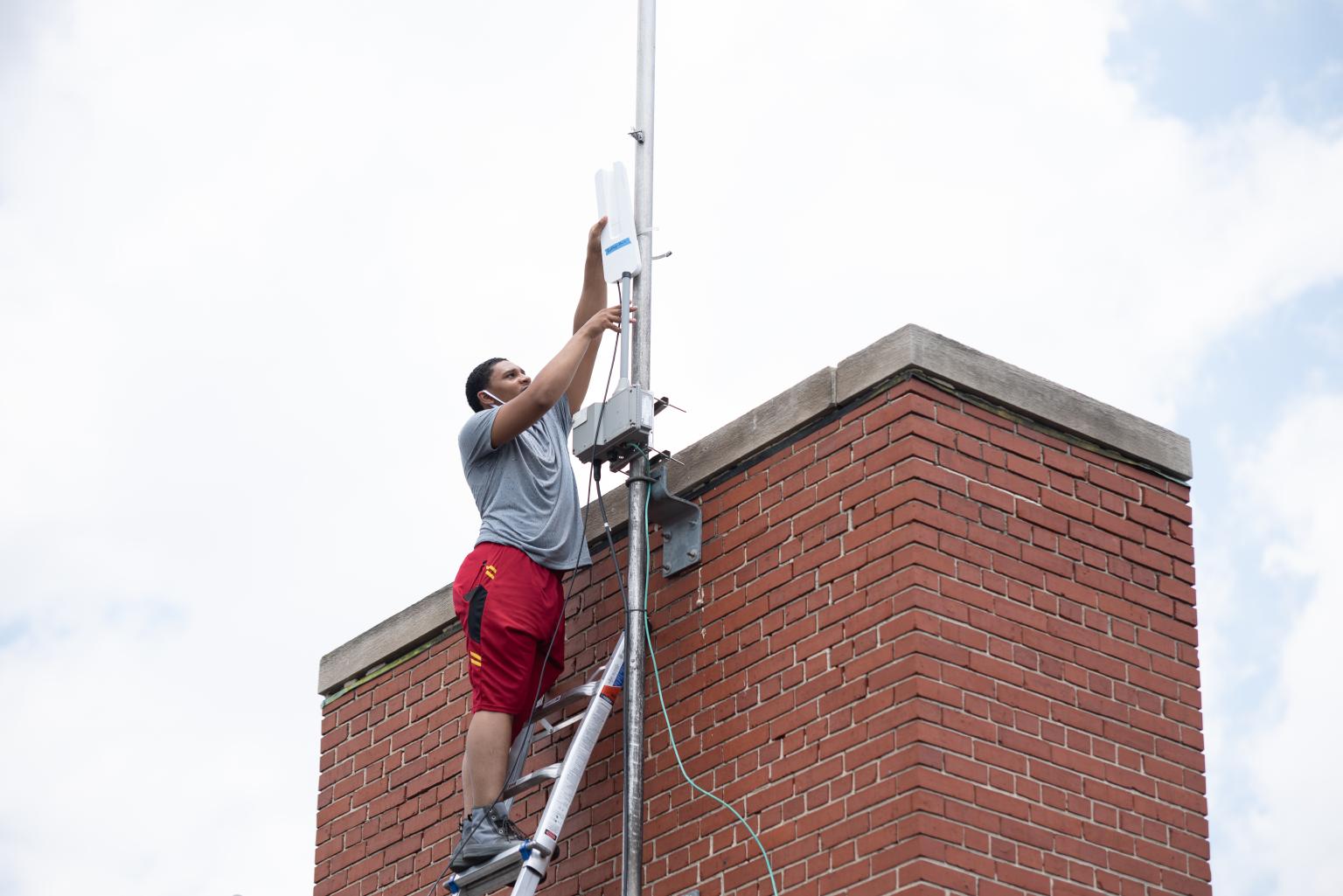Verizon is here to stay in Philly — at least for the next five years — and the deal bodes well for digital equity.
Philadelphia City Council last week approved extending Verizon’s franchise agreement until 2029. The original agreement, approved 15 years ago, bumped Comcast from its spot as the only major cable and internet service provider in the city. Nearly two decades of digital efforts later, Philadelphians have witnessed several movements toward advancing equity, many of which were cut short by lack of funds.
Part of the recent deal to continue Verizon’s presence includes an agreement to build out broadband internet service in recreation centers across the city. The effort expands free internet access to Philadelphians at a time when federal programs subsidies are winding down.
To go into effect, the bill just needs Mayor Cherelle Parker’s signature, which appears likely.
“This bill was introduced in council at the Parker administration’s request,” a spokesperson for the mayor Joe Grace told Technical.ly, “and it is anticipated that the mayor will support this legislation.”
The recent legislation builds on Philadelphia’s rocky history with free and accessible internet, including some ambitious initiatives that fell flat over the years. Read on for a timeline of major digital equity moments in the city over the last two decades.
2004-2006: Wireless Philadelphia lacks the infrastructure to thrive
In the early 2000s, Philadelphia aimed to be the first big city to invest in a publicly-owned and operated citywide wireless network. That’s how Wireless Philadelphia, its attempt to make broadband easily accessible and affordable for all Philadelphians through a municipal network, came to be.
The project lacked support from large internet service providers Comcast and Verizon, but ended up accepting a bid from smaller ISP EarthLink. However, there were issues with the company’s infrastructure and lack of interest from customers led to the project’s failure.
However, the ambition of the project laid the foundation for future digital equity projects, like the Freedom Rings partnership.
2010: Freedom Rings, KEYSPOTS fizzle out due to lack of funding
A collaboration of community organizations, nonprofits and city government came together to form the Freedom Rings Partnership that focused on bringing computer and internet access to all in 2010.
Funded by President Obama’s 2010 Broadband Technology Opportunities program (BTOP) and the National Telecommunications and Information Administration, Freedom Rings used the money to build out local WiFi connectivity. The project originally requested grants to build out broadband infrastructure in Philadelphia Housing Authority communities, a digital literacy collaborative and free public computing centers.
In the end, only the second two ideas were approved for funding and the partnership, which eventually rebranded to KEYSPOTS. The program went on to open around 70 public computing centers across the city, provide digital literacy education and distribute devices. These centers have closed over the years due to lack of funding and the KEYSPOTS website has been deactivated.
2011: Comcast launches low-cost internet plan
Comcast launched Internet Essentials in Philadelphia in 2011 as a low-cost internet plan for families with low-income who qualify for other assistance programs. When it was launched, the plan offered an 80% discount for internet services at $9.95 per month and the program maintains that discounted price today.
At the start of the pandemic, Comcast offered this program for free to eligible families through the end of 2020. Lately, Comcast has used the end of the Affordable Connectivity Program (ACP) to switch more locals over to the Internet Essentials program.
2017: Digital Literacy Alliance funds digital equity projects
The City of Philadelphia launched the Digital Literacy Alliance (DLA), a coalition of digital equity partners supported by the Philadelphia City Fund, in 2017. The Alliance provides grants for digital equity and inclusion projects in Philadelphia.
DLA later launched the city’s digital navigators program in 2020. This program works with Drexel University’s ExCITe Center, SEAMAAC and Beyond Literacy to provide professional navigators that can assist Philadelphians access the internet, sign up for digital literacy classes, set up their devices and troubleshoot other internet related challenges. Digital Navigators continue to assist Philadelphians with all their internet access needs and the program expanded to the suburbs last year.
2020: PHLConnectED, PCW help people get online during the pandemic
The School District of Philadelphia and the City of Philadelphia partnered in the summer of 2020 to provide free internet access to K-12 families so they could access online school. The program offered internet service through Comcast’s Internet Essentials and distributed hotspots for families in need.
COVID-19 emergency grants from the federal government funded the project, along with donations from local foundations, Comcast, family foundations and school contributions. PHLConnectED ran out of money in 2023.
Other projects, like Philadelphia Community Wireless, popped up in 2020 to help get local people online, too. PCW provides free internet to North Philadelphians, and is still active today.
April 2024: ACP goes dry, federal funding options at a stand still
Philadelphia shifted its focus to getting families signed up for the federal Affordable Connectivity Program after PHLConnectED ended. But ACP started winding down last winter.
Advocates hoped Congress would allocate more funding, though that didn’t work out. April was the last fully funded month of ACP and the program switched to a partial subsidy in May. The program officially lapsed last week.
May 2024: Verizon inks deal that includes rec centers
Verizon’s franchise deal involves building out publicly accessible 1G broadband internet service to 183 Philadelphia Parks and Recreation facilities. It’ll cost the city about $5 million over five years. The ISP will also install dark fiber connection at these facilities, extending the city’s internal network, which will cost $7.6 million over five years.
Updated at 4:40 p.m.







